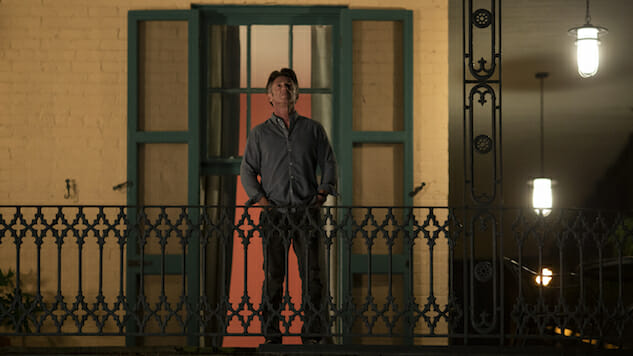Once, there was science fiction about life on other planets. Those works were generally about aliens.
Now, it’s pretty much just about alienation.
While The First is not the most epically dystopian TV series of its sub-genre, walk on if you’re hoping for something lighthearted. You’re not going to get it here. This is a pretty believable future: voice-commanded self-driving cars are normal, there’s a decent amount of VR tech, and Congress is still bickering relentlessly while the environment crumbles. And the inevitable clashes of corporate and government interests, ego and concern for others, science and philosophy, ambition and ethics, goodness and greatness are exactly as they always have been and presumably always will be. The look and feel of the production is bleak, a little down-and-out and pretty politically fraught. (Agnieszka Holland directs the first two episodes, and her signature preoccupation with day-to-day human drama sets itself nicely against the very non-mundane circumstance of crewing the first potential human inhabitants of Mars). The tone of the series is by turns optimistic and elegiac, and there’s a fascinating interplay between the plot, which is extremely future-facing, and the characters, who are, pretty much 100%, tethered to Earth by the gravity of the past. McElhone, Penn, and Jacoby-Heron basically knock it out of the park, and the setting (New Orleans) is a character in its own right, one that adds a layer of mournful beauty and tops it off with a coat of grand-guignol wackiness. What I’m saying is that this is a story of deep contrast and deep conflictedness. Conflictedness is its unifying principle.
So. Without giving away the goods: The First is artful, very well-acted, and takes on some fairly significant questions. The question of whether we should be attempting to colonize another planet, sure. But that is in many ways the least significant question posed by this script. Much more in the foreground are things like: What is our relationship to the planet we’re currently on? What does it mean to be a pioneer, and how do we weigh the impact on other people against the urge to seek new ground? Indeed, the idea of “groundedness” in every imaginable sense of the word is constantly in play in this show. For that matter, we get a pretty thorough treatise on the multiple meanings of getting high (especially in a beautifully done scene set at The Pearl, inside something that looks a lot like a spaceship).
Most of all, The First examines alienation. People estranged from parents, from children, from spouses, from bosses. People seeking connections and very often failing (making it very poignant when they occasionally succeed). People stranded in their own memories. There’s a sort of fish-tank feeling to The First, if that makes sense. Watching it made me feel I was looking at a world behind a layer of glass, or through water. It’s an interesting effect, if not entirely comfortable. These characters are all struggling with dual impulses: to keep their feet on the ground and to fly away. It’s a very well-articulated equipoise, and I’m eager to see where it goes.
The First premieres Friday, September 14 on Hulu.
Amy Glynn is a poet, essayist and fiction writer who really likes that you can multi-task by reviewing television and glasses of Cabernet simultaneously. She lives in the San Francisco Bay Area.